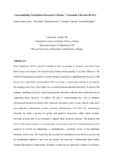Conceptualising translational research in schools: A systematic literature review

View/
Date
2022-05-25Author
Jones, Sarah-Louise
Hall, Tony
Procter, Richard
Connolly, Cornelia
Fazlagić, Jan
Metadata
Show full item recordUsage
This item's downloads: 30 (view details)
Recommended Citation
Jones, Sarah-Louise, Hall, Tony, Procter, Richard, Connolly, Cornelia, & Fazlagić, Jan. (2022). Conceptualising translational research in schools: A systematic literature review. International Journal of Educational Research, 114, 101998. doi:https://doi.org/10.1016/j.ijer.2022.101998
Published Version
Abstract
Since Stenhouse (1975) called for teachers to have ownership of research, there have been initial forays into teacher led research and evidence-based practice in schools. However, the notion of translational research in schools remains contested, in significant part because it still has not been rigorously conceptualised. This is an issue of increasing concern, in our rapidly developing world. Now, more than ever, we need research-informed education, to address the complex challenges faced by school communities, and those with the most significant role in supporting them: teachers. To address the gap in understanding how best to promote translational research in schools, this systematic literature review asked, what do innovative and impactful translational, teacher research infrastructures look like? By translational research, we mean a process of agentic and agonistic democracy within which teachers critically develop and, or use research to support their classroom practice. The purpose and focus of this paper therefore, is to present the current extent and form of translational research practices in schools by undertaking a comprehensive, systematic review of the published literature on the issue. We found that the potential for translational research in education can be considerably enhanced when five key themes are taken into consideration, these being: Teacher-Researcher Collaboration; Teachers as Researchers; Research Cultures in Schools; Teacher Agency; Sharing, Accessing and Utilizing Research. The notion of technology - as a theme in its own right - was notable by its absence. From the findings we have been able to propose a foundational framework of translational research in schools. To date there have been no other systematic literature reviews on translational research in education, nor any frameworks proposed; and thus this paper addresses a significant gap in the field.
Collections
Related items
Showing items related by title, author, creator and subject.
-
Dynamic consent: a potential solution to some of the challenges of modern biomedical research
Budin-Ljøsne, Isabelle; Teare, Harriet J. A.; Kaye, Jane; Beck, Stephan; Bentzen, Heidi Beate; Caenazzo, Luciana; Collett, Clive; D’Abramo, Flavio; Felzmann, Heike; Finlay, Teresa; Javaid, Muhammad Kassim; Jones, Erica; Katić, Višnja; Simpson, Amy; Mascalzoni, Deborah (Springer Nature, 2017-01-25)Background: Innovations in technology have contributed to rapid changes in the way that modern biomedical research is carried out. Researchers are increasingly required to endorse adaptive and flexible approaches to ... -
The impact of advertising patient and public involvement on trial recruitment: embedded cluster randomised recruitment trial
Hughes-Morley, Adwoa; Hann, Mark; Fraser, Claire; Meade, Oonagh; Lovell, Karina; Young, Bridget; Roberts, Chris; Cree, Lindsey; More, Donna; O’Leary, Neil; Callaghan, Patrick; Waheed, Waquas; Bower, Peter (Springer Nature, 2016-12-01)Background: Patient and public involvement in research (PPIR) may improve trial recruitment rates, but it is unclear how. Where trials use PPIR to improve design and conduct, many do not communicate this clearly to potential ... -
Selection, collection and analysis as sources of evidence in case study research
Houghton, Catherine; Casey, Dympna; Smyth, Siobhan (RCN Publishing Ltd., 2017-03-22)Background Case study research is a valuable way to explore and describe nursing phenomena in their natural contexts. Multiple sources of evidence are critical in this approach. It is imperative that the strategies for ...

